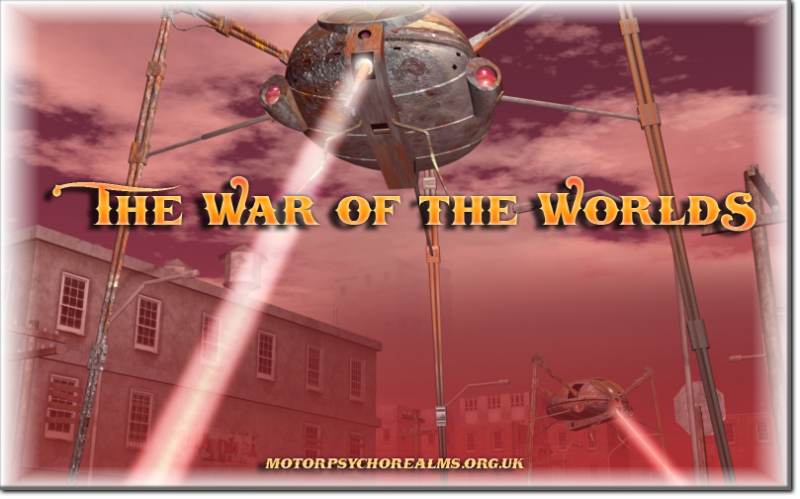The War of the Worlds

'No one would have believed in the last years of the nineteenth century.............'
The War of the Worlds
The War of the Worlds (1898), by H. G. Wells, is an early science fiction novella which describes an invasion of England by aliens from Mars. It is one of the earliest and best-known depictions of an alien invasion of Earth, and has influenced many others, as well as spanning several films and a television series based on the story. When it was broadcast on the radio, it caused a public panic because it was in such a realistic style that people thought that it was a news broadcast describing current real events of a real alien invasion.
Set in the early 20th century, the story begins with an unnamed narrator (essentially a fictionalised version of Wells), who has been invited to an observatory in Ottershaw by a "noted astronomer" named Ogilvy. There he witnesses an explosion on the surface of the planet Mars, one of a series of such events that arouses much interest in the scientific community. A short time later, a "meteor" is seen landing on Horsell Common, near London. The narrator's home is close by, and he is among the first to discover the object is a space-going, artificial cylinder launched from Mars. The cylinder opens, disgorging the Martians: bulky tentacled creatures that begin setting up strange machinery in the cylinder's impact crater. A human deputation moves towards the crater waving a white flag of truce and is incinerated by a laser-like Heat-Ray.
After the attack, the narrator takes his wife to Leatherhead to stay with relatives until the Martians are killed, but upon returning home, he sees firsthand what the Martians have been assembling: towering three-legged "fighting-machines" armed with the Heat-Ray and a chemical weapon: "the Black Smoke". The tripods smash through the army units now positioned around the crater and attack the surrounding communities. The narrator meets a retreating artilleryman, who tells him that another cylinder has landed between Woking and Leatherhead, cutting the narrator off from his wife. The two men try to escape together, but are separated during a Martian attack on Shepperton.
More cylinders land across the English countryside, and a frantic mass evacuation of London begins; among the fleeing swarms of humanity is the narrator's brother, who is thrown together with the wife and the younger sister of a man named Elphinstone; the three of them eventually gain passage on a ship, crossing the English Channel to safety. One of the tripods is destroyed in the Shepperton battle by an artillery barrage and two more are brought down in Tillingham Bay by the torpedo ram HMS Thunder Child before the vessel is sunk, but soon all organised resistance has been beaten down and the Martians hold sway over much of southern England.
The narrator becomes trapped in a half-destroyed building overlooking the crater of one of the later Martian landing sites and covertly witnesses the Martians close at hand, including their use of captured humans as a food supply through the direct transfusion of their blood. He is not alone; with him is a curate whose intellect and reason have been damaged by the trauma of the attacks and whose irrational behaviour finally causes him to be discovered and dragged away by the Martians. The narrator barely avoids the same fate, and the Martians eventually abandon their encampment. The narrator then travels into a deserted London where he discovers that the invaders have abruptly succumbed to terrestrial disease-causing microbes, to which they have no immunity. The narrator is unexpectedly reunited with his wife, and they, along with the rest of humanity, set out to face the new and expanded view of the universe which the invasion has thrust upon them.
from Wikipedia licensed under the GNU Free Documentation License
'Abruptly, the sound ceased'

